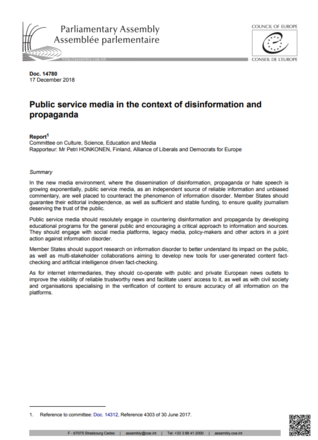
After presenting a 2018 draft resolution in which the Parliamentary Assembly reiterates the role of PSM for democracy and calls for a series of fundamental good practices in the PSM sphere (editorial and institutional independence of PSM, stable funding, regulation, research and multi-stakeholders discussions), the rapporteur introduces the complex and dynamic processes undergoing between PSM and the information disorder phenomenon.
- He first undertakes a series of fundamental definitions needed to address this topic. Instead of ‘fake news’, a term “far too politicised to be useful in analytical and policy work”, he recommends using the ‘information disorder’ expression, splitting it into 3 main components: disinformation, misinformation and mal-information. Then, he presents a series of normative characteristics that, according to core stakeholders such as the European Broadcasting Union, Public Media Alliance, Council of Europe and UNESCO, every PSM should display and perform. These include independence (“They are neither commercial nor State-owned”, but “financed and controlled by the public, for the public”), universality of content and access, excellence furtherance, promotion of democratic principles (social, political and cultural citizenship, diversity, social cohesion) and innovation.
- Second, the rapporteur presents a variety of institutional configurations of PSM across Europe, from the BBC experience to “the relatively newly established” Balkan ones, evidencing good features as well as different kinds of political control. For instance, the author explains that “the growing preference of taxpayer-generated funding by governments has given them more budgetary influence that, in many cases can, and has, lead to more State-controlled content or weakened possibilities to counter challenges such as disinformation and propaganda”.
- Third, the rapporteur introduces innovative practices undertaken by PSM at the global level to promote “quality journalism”. Among these, to be mentioned the plan Vision 2020 fostered by the European Broadcasting Union, a recent multi stakeholder conference in Slovenia, the Journalism Academy of the Finnish public broadcasting company Yle. As for editorial integrity, the report cites “Nedeljom u 2” political talk show from the Croatian television, the Serbian experimental digital channel RTS Digital (now RTS 3) and the BBC example. Also, the report underlines technology-driven solutions such as those provided by the German ARD Tagesschau website or the Croatian app HRTi for all HRT’s productions.
- Fourth, given the fact that PSM are also showing “how stories can be manipulated and how statistics can be misused to create false and misleading perspectives”, the author cites the Spanish RTVE featured documentary “Guerra a la Mentira”, a “Finnish crowd-sourced series on Russian online trolling activities in Finland”, or the specially dedicated ‘fake news’ website of Deutsche Welle, also reporting how “specific fact-checking initiatives both verify information and foster awareness” such as the BBC’s “Reality Check”.
- Another point the report underlines is the need of developing targeted online communication with young people. Here the Belgium’s RTBF special policy on media literacy is presented, as well as different “toolkits” such as “France TV Education”, the educational teaching module of Swiss SRF “My School”, the Yle “News Classroom” project in Finland or the BBC’s interactive game “BBC iReporter”. Besides, online and mobile social presence seems to be another challenge for PSM organizations. Here examples come from the Finnish public broadcaster’s content hub for younger audiences or the German unconventional interview series “Ich würde nie” by Deutschlandfunk Nova. As for attracting young audiences through fiction, the web series “Skam” by NRK of Norway represents one of the most successful cases.
- Finally, as stated in the report, “collaborations with other news providers as well as with independent fact-checkers are a strategy for several public service broadcasters”.
The content of this article can be used according to the terms of Creative Commons: Attribution-NonCommercial 4.0 International (CC BY-NC 4.0) . To do so use the the wording "this article was originally published on the Resource Centre on Media Freedom in Europe" including a direct active link to the original article page.

